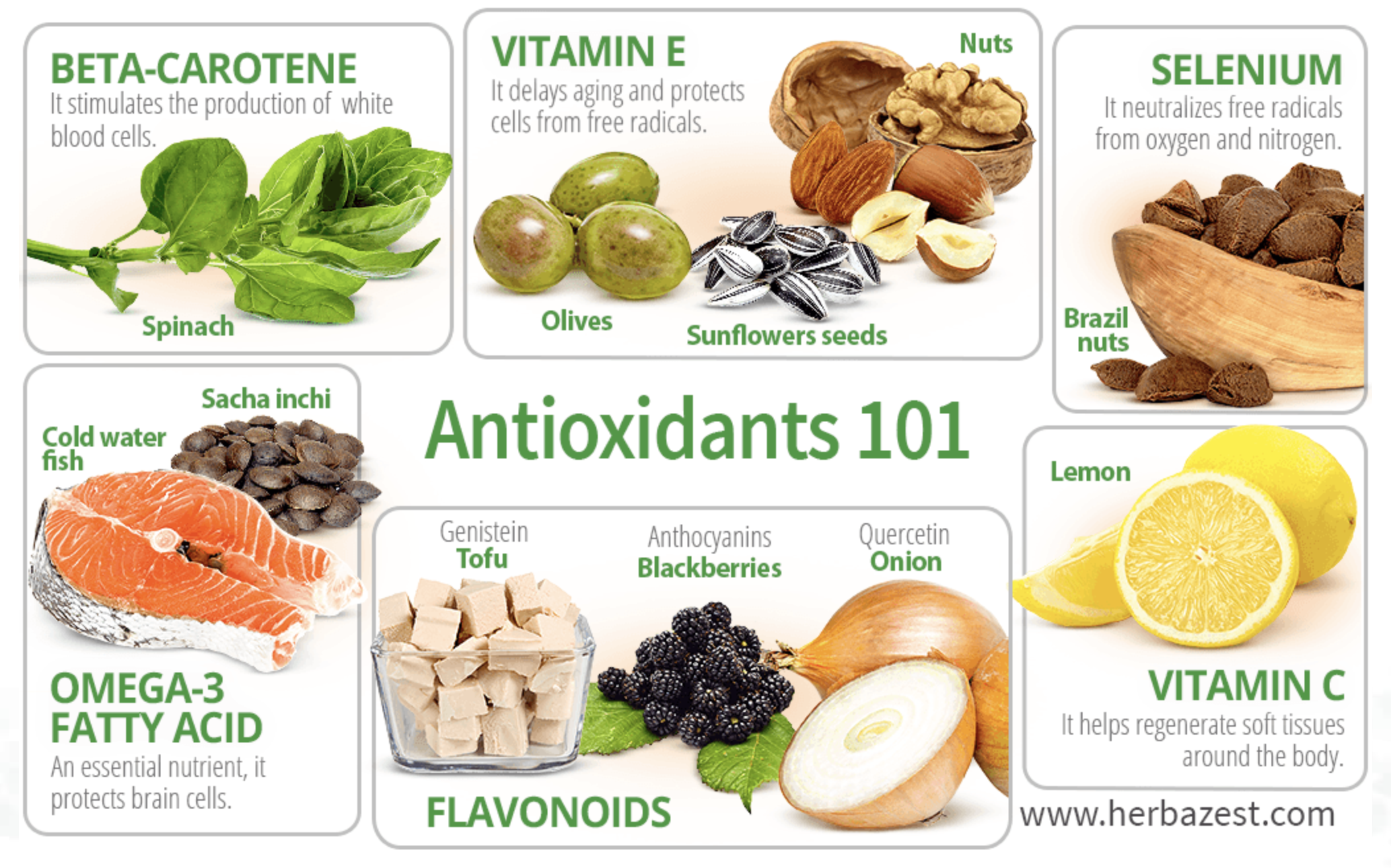Antioxidants 101
In today's fast-paced world, it's essential to prioritize our health and well-being. When it comes to maintaining a healthy lifestyle, the importance of antioxidants cannot be overstated. These remarkable compounds play a crucial role in protecting our bodies from the damaging effects of free radicals. In this blog post, we will explore what antioxidants are, how they work, and the significant nutritional benefits they offer. So, let's dive into the world of antioxidants and discover why they are vital for our overall health and longevity.
What Are Antioxidants?
Antioxidants are substances that help prevent or slow down oxidative damage in the body caused by free radicals. Free radicals are highly reactive molecules that are produced naturally during various metabolic processes or introduced through external sources such as pollution, radiation, and unhealthy diets. When free radicals accumulate in the body, they can cause oxidative stress, leading to cellular damage and an increased risk of chronic diseases.
Antioxidants have the unique ability to donate electrons to free radicals without becoming reactive themselves. By doing so, they stabilize the free radicals, preventing them from causing damage to other molecules in the body. This process breaks the chain reaction of free radical formation.
Types of Antioxidants:
There are several types of antioxidants, each with its unique mechanisms and benefits. Some of the most notable antioxidants include:
Vitamin C: Found in citrus fruits, strawberries, bell peppers, and leafy greens, vitamin C is a potent antioxidant that helps protect against immune system deficiencies, cardiovascular diseases, and skin aging.
Vitamin E: Abundant in nuts, seeds, and leafy greens like broccoli and microgreens. Vitamin E aids in protecting cell membranes, supports eye health, and may reduce the risk of certain cancers and age-related cognitive decline.
Beta-carotene: Found in brightly colored fruits and vegetables like carrots, sweet potatoes, and apricots, beta-carotene is converted into vitamin A in the body. It supports vision, immune function, and skin health.
Selenium: This mineral is present in Brazil nuts, seafood, and whole grains. Selenium acts as a powerful antioxidant, supporting thyroid function, boosting immunity, and reducing the risk of certain cancers.
Flavonoids: Abundant in fruits, vegetables, and herbs, flavonoids are a diverse group of antioxidants associated with numerous health benefits, including reduced inflammation, improved heart health, and enhanced cognitive function.
Nutritional Benefits of Antioxidants:
Including antioxidants in your diet can provide a wide range of nutritional benefits, including:
Reduced Inflammation: Chronic inflammation is associated with various diseases, including arthritis, diabetes, and heart disease. Antioxidants help reduce inflammation by neutralizing free radicals and inhibiting inflammatory pathways.
Boosted Immunity: Antioxidants help strengthen the immune system, supporting its ability to fight off infections and diseases. This can result in a reduced frequency and severity of common illnesses.
Skin Health: Antioxidants like vitamin C and E help combat oxidative stress in the skin, reducing signs of aging such as wrinkles, fine lines, and age spots. They also promote a healthy complexion and protect against sun damage.
Eye Health: Certain antioxidants, such as lutein and zeaxanthin found in leafy greens and eggs, play a crucial role in maintaining optimal eye health. They help protect against age-related macular degeneration and cataracts.
Nrf2 and Antioxidants
Antioxidants and Nrf2 are intricately connected in the body's defense against oxidative stress and maintaining overall cellular health. Nrf2 (nuclear factor erythroid 2-related factor 2) is a transcription factor that plays a critical role in regulating the antioxidant response within cells. It acts as a master switch, activating the expression of genes involved in the production of antioxidant enzymes and other protective molecules.
Antioxidants work in tandem with Nrf2 by providing the necessary molecules to activate and support its function, leading to enhanced cellular defense against oxidative stress.
Powerful Antioxidant Foods
In no particular order
Apples contain antioxidants like flavonoids and vitamin C
Oranges are rich in vitamin C, a potent antioxidant that supports immune health.
Broccoli Microgreens are believed by many to have the most potent plant based antioxidant, sulforaphane.
Spinach is an excellent source of antioxidants like vitamin C, vitamin E, beta-carotene, and lutein, which are beneficial for overall health.
Kale is a nutrient-dense leafy green vegetable that contains high levels of antioxidants, including vitamins A, C, and K, as well as lutein and zeaxanthin.
Green Tea is rich in catechins, a type of antioxidant compound that provides numerous health benefits, including potential anti-inflammatory effects.
Red Cabbage is known for its vibrant color, which is due to the presence of anthocyanins. It also contains other antioxidants like vitamin C and manganese.
Dark Chocolate with a high percentage of cocoa solids is a great source of antioxidants, particularly flavonoids.
Red Bell Peppers are not only colorful and flavorful but also rich in antioxidants like vitamin C and beta-carotene.
Almonds are a nutritious snack that provides vitamin E, a powerful antioxidant.
Conclusion:
Incorporating a variety of antioxidant-rich foods into your diet is an excellent way to promote overall health and protect your body from oxidative damage. By neutralizing free radicals and reducing the risk of chronic diseases, antioxidants offer remarkable benefits, including cellular protection, strengthened immunity, improved skin health, enhanced eye health, and reduced inflammation.


